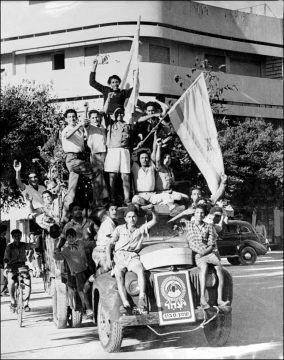Matthew Hughes in The Guardian:
 Rashid Khalidi’s account of Jewish settlers’ conquest of Palestine is informed and passionate. It pulls no punches in its critique of Jewish-Israeli policies (policies that have had wholehearted US support after 1967), but it also lays out the failings of the Palestinian leadership. Khalidi participated in this history as an activist scion of a leading Palestinian family: in Beirut during the 1982 Israeli invasion of Lebanon, and as part of the Palestinian negotiating team prior to the 1995 Israeli-Palestinian peace accords. He slams Israel but his is also an elegy for the Palestinians, for their dispossession, for their failure to resist conquest. It is a relentless story of Jewish-Israeli bad faith, alongside one of Palestinian corruption and political short-sightedness.
Rashid Khalidi’s account of Jewish settlers’ conquest of Palestine is informed and passionate. It pulls no punches in its critique of Jewish-Israeli policies (policies that have had wholehearted US support after 1967), but it also lays out the failings of the Palestinian leadership. Khalidi participated in this history as an activist scion of a leading Palestinian family: in Beirut during the 1982 Israeli invasion of Lebanon, and as part of the Palestinian negotiating team prior to the 1995 Israeli-Palestinian peace accords. He slams Israel but his is also an elegy for the Palestinians, for their dispossession, for their failure to resist conquest. It is a relentless story of Jewish-Israeli bad faith, alongside one of Palestinian corruption and political short-sightedness.
Khalidi sets out his stall early on: the Palestine-Israel war was never one between two national movements contesting equally over the same land but was always a “settler colonial conquest” by Europe-based Zionists whose founding father, Theodor Herzl, laid bare the project to Khalidi’s great-great-great uncle in 1899: Palestine’s indigenous population did not matter and would anyway benefit from the modernising effects of Jewish “pioneers”, such as America with its westward Manifest Destiny. For Khalidi, Jewish settlers, aided by Britain from 1917, and by the US later on, colonised Palestine, creating and securing Israel through six “wars”: the Balfour declaration of 1917; the 1947 UN partition plan; the 1967 UN security council resolution 242; the 1982 Israeli invasion of Lebanon; the 1993 Oslo peace accords; and Israeli leader Ariel Sharon’s Temple Mount visit in 2000.
Palestinian leaders from elite notables in the 1930s to Yasser Arafat and PLO-Fatah in the 60s to Hamas never successfully channelled the people’s passion to resist. This is not to “blame the victim”. Khalidi points to the huge obstacles in the way: in Britain and later the US, Protestant Christians bought into this “colonial war” to “civilise” the native population. There is a useful tension here between colonial superstructure and the patriarchal hierarchy and cronyism underpinning Palestinian elite leadership. Jewish-Israeli perfidy is central to Khalidi’s study but bubbling up through the text are key moments of resistance that demanded the insurgent organisation and charisma of a Michael Collins, a Mahatma Gandhi, or a Ho Chi Minh. This never happened. Instead, the well-organised Zionist movement (and Israel) instinctively divided disunited opposition.
More here.
